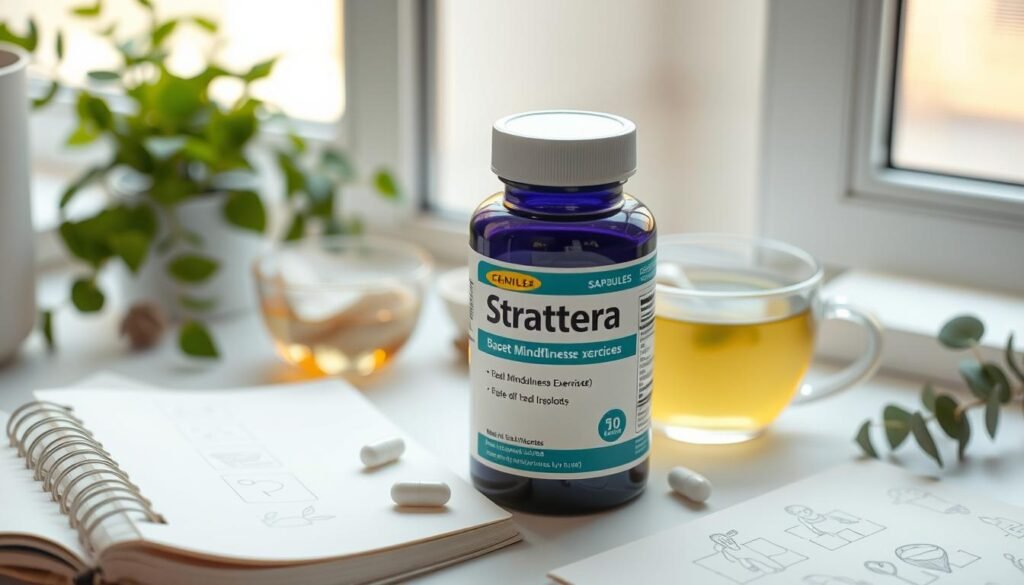An estimated 6.1 million kids in the U.S. have ADHD. Strattera, or atomoxetine, is known for ADHD treatment but is also being looked into for anxiety. This article talks about how Strattera can help with anxiety, its side effects, and how it’s different from other meds. Strattera is a non-stimulant option, which might be better for some people to manage their anxiety without the risks of stimulants.
Key Takeaways
- Strattera is mainly for ADHD but can also help with anxiety.
- It’s a non-stimulant option, making it different from other anxiety treatments.
- It’s important to keep an eye on someone using Strattera because of possible side effects and to check progress.
- Side effects can include changes in mood and behavior, so watching over a person using it is needed.
- Strattera might be a better pick when someone has both ADHD and depression.
- It usually takes 3-4 weeks to see the full benefits of atomoxetine.
- Thinking about natural supplements for anxiety can be helpful too; check more at natural supplements for anxiety relief.
Understanding Strattera and Its Uses
Strattera, with the generic name atomoxetine, is a medicine for treating ADHD. It’s a non-stimulant alternative, which is different from usual stimulant meds. It is especially good for those who also feel anxious. Lately, it’s been looked at as a possible anxiety medication too.
What is Strattera?
Strattera falls under selective norepinephrine reuptake inhibitors (NRIs). It increases norepinephrine, helping with mood and focus. The FDA gave it a nod in 2002 as an ADHD treatment, avoiding addiction risks seen with stimulants. Now, it’s also getting noticed for anxiety relief.
How Strattera Works for Anxiety
Strattera stops too much norepinephrine from being taken back up in the brain. This can ease worry and restlessness seen in anxiety disorders. People like it because it doesn’t lead to dependency like older treatments. It’s becoming a popular choice for managing ADHD and anxiety together.
Strattera for Anxiety Treatment: Overview
Mental health experts are now looking at Strattera for anxiety treatment. Although it’s mainly for ADHD, its key part, atomoxetine, helps with anxiety too. This drug helps increase norepinephrine in the brain. So, it relieves anxiety without the usual side effects of similar treatments.
Off-Label Use of Strattera
Strattera is also getting noticed for managing generalized anxiety disorder, not just ADHD. It works on brain chemicals serotonin and norepinephrine, helping those with both conditions. More people recognizing anxiety issues has led to a bigger use of Strattera off-label. Doctors might suggest it to those who want something different than standard stimulants.
How Common is the Prescription of Strattera for Anxiety?
Strattera is being prescribed more for anxiety, showing a new direction in treating mental health. Many patients with anxiety find it effective, especially if other meds didn’t work or if there’s a concern about addiction. Strattera is appealing because it doesn’t lead to dependency. Ongoing research could show even more ways Strattera helps with anxiety disorders.

Benefits of Using Strattera for Anxiety Management
Strattera is now a top choice for managing anxiety, especially for those looking for non-traditional options. It’s a non-stimulant medicine that brings many benefits, improving mental health significantly.
Improvement of Mood and Stress Relief
Strattera is great at lifting mood. It boosts brain chemicals like norepinephrine and serotonin. This helps reduce anxiety symptoms. Studies show Strattera lowers stress, making people feel emotionally better. Users often feel their mood becomes more stable, showing how valuable Strattera is for treating anxiety.
Non-Stimulant Option for Anxiety Treatment
Strattera is different because it’s not a stimulant. This is good for people who react poorly to stimulants or those who have had addiction issues. With almost no risk of abuse, Strattera is a relief for doctors and patients. It’s great for those dealing with ADHD and anxiety. It helps with focus and eases anxiety too.

| Benefit | Details |
|---|---|
| Improvement of Mood | Enhances emotional stability, reducing anxiety symptoms through serotonin and norepinephrine elevation. |
| Non-Stimulant | Preferred for individuals with stimulant sensitivity or history of substance abuse. |
| 24-Hour Focus | Provides ongoing focus without affecting sleep in 90% of patients. |
| Less Side Effects | Lower chance of causing tics compared to traditional stimulants. |
| Low Abuse Potential | The non-controlled nature reduces the risk of misuse significantly. |
In summary, Strattera effectively balances mood and provides a safe, non-stimulant choice for many patients. It stands out by improving mood and managing anxiety well, making it a key therapy option.
Strattera vs. Other Anxiety Medications
There are many medications for ADHD and anxiety. Each one works differently. When comparing Strattera to stimulant medications, you’ll find they affect anxiety in different ways.
Comparison with Stimulant Medications
Adderall and Ritalin are stimulants that help about 70% of ADHD patients. They work fast and bring quick relief. But, these meds might make anxiety worse for some people. That’s a big problem.
Strattera is different because it’s not a stimulant. It helps you focus but doesn’t make you feel jittery. For those with ADHD and anxiety, Strattera could be a better choice.
Atomoxetine’s Role in ADHD and Anxiety
Strattera, also known as atomoxetine, is an option for controlling ADHD anxiety. It’s a type of medicine that focuses on norepinephrine in the brain. This can improve attention without the downsides of stimulants.
It’s less likely to cause dependency or mood swings. This is good news for people handling both ADHD and anxiety. Adding therapy to medication can give even better results. For more on treatment options, you can look at this article.
Potential Side Effects of Strattera for Anxiety
Strattera helps manage anxiety but comes with various side effects. Knowing them helps users watch their health during treatment. It’s important to know both common and serious side effects. This way, you can talk to your doctor on time.
Common Side Effects
Here are the common side effects of Strattera:
- Nausea
- Vomiting, especially in kids and teenagers
- Decreased appetite
- Dizziness
- Fatigue
- Constipation, mainly in adults
For kids, there’s a risk of slower growth in the first year. Most of these common side effects of Strattera can make you uncomfortable but can be handled.
Serious Side Effects to Monitor
Though rare, watch out for serious side effects of Strattera like:
- Liver damage
- Severe allergic reactions with rash, swelling, and breathing trouble
- Suicidal thoughts or actions in young people
- Heart problems, including attack and stroke
- Painful, long-lasting erections (priapism)
Keep an eye on these serious side effects to stay safe. Tell your doctor about any worrying symptoms. For tips on reporting side effects in the U.S., check out this resource for advice on health concerns.

Dosage and Administration of Strattera
Knowing the right strattera dosage is key to managing anxiety well. Each person’s dosage might change due to age, weight, and health. It’s important to talk to a doctor. Strattera comes in different strengths like 10 mg, 18 mg, 25 mg, 40 mg, 60 mg, 80 mg, and 100 mg. This makes it easier to adjust the dose for each person’s needs.
Recommended Dosage for Anxiety
The recommended dosage for anxiety is different for kids and adults. For kids under 70 kg, they start with 0.5 mg/kg a day. This can go up to 1.2 mg/kg for regular use. Kids over 70 kg and adults start at 40 mg a day. This might be increased to 80 mg, but shouldn’t go over 100 mg a day. This way, anxiety is managed well with fewer side effects.
Optimal Timing for Taking Strattera
When to take Strattera is also important. Many people find it helps to take it in the evening. This can help avoid feeling sleepy during the day. Always talk to your doctor about when to take your medication. They can help set the best schedule. If you forget a dose, take it on the same day. But never take double. Staying consistent with your medication is very important.
Who Should Consider Strattera for Anxiety?
Finding the right people for Strattera treatment is key to managing anxiety well. The best candidates for Strattera are those who show signs of anxiety, especially if they also have ADHD. With more people in the United States looking for help with anxiety, Strattera is getting attention as a non-stimulant option.
Ideal Candidates for Strattera Treatment
Strattera is known for treating ADHD and could also help those with generalized anxiety disorder. It’s good for patients who couldn’t handle stimulant medications, which can sometimes cause dependency. These people want to ease their anxiety without the risks tied to traditional stimulants.
- Individuals with coexisting mental health disorders such as depression.
- Patients who previously responded well to atomoxetine for ADHD.
- People at risk of substance dependence or those prioritizing a lower potential for abuse.
- Individuals experiencing anxiety symptoms that include irritability, fatigue, or difficulty concentrating.
Strattera works by affecting neurotransmitters like norepinephrine and serotonin, which can help with anxiety. It’s a solid choice for those dealing with mood and stress issues. If you’re considering it, talk to a healthcare provider to see if it fits your needs and how it might help with your anxiety.
| Candidate Type | Reason for Consideration |
|---|---|
| Patients with ADHD | Strattera’s effectiveness in reducing anxiety symptoms alongside ADHD. |
| Individuals intolerant to stimulants | Lower risk of dependency and abuse with non-stimulant medications. |
| People with coexisting depression | Potential benefits of managing anxiety symptoms and improving overall mood. |
| Candidates prioritizing non-stimulant treatment | Strattera offers an alternative approach to managing anxiety without stimulant-related side effects. |
Understanding these ideal candidates for Strattera treatment helps people and doctors make smart choices about managing anxiety.
Alternative Treatment Options for Anxiety
Many people look for ways to ease anxiety without using Strattera. They can try non-stimulant medicines and therapeutic ways. This mix offers a full plan for easing anxiety signs.
Other Non-Stimulant Medications
Non-stimulant meds are now known for their power in treating anxiety. Here are some often used ones:
| Medication | Dosage | Indications |
|---|---|---|
| Atomoxetine (Strattera) | 0.5-1.4 mg/kg per day | ADHD and anxiety symptoms |
| Long-acting Guanfacine (Intuniv) | 1-4 mg daily | ADHD and anxiety management |
| Clonidine XR (Kapvay) | 0.1-0.3 mg, taken 2-3 times daily | ADHD and anxiety |
| SSRIs (e.g., Sertraline, Escitalopram) | Varies by medication | Anxiety disorders |
| SNRIs (e.g., Venlafaxine, Duloxetine) | Varies by medication | Anxiety disorders |
Meds like SSRIs and SNRIs are good for anxiety. They offer an option for those looking for Strattera alternatives. These non-stimulant medications work well for many people.
Apart from meds, treatments like cognitive-behavioral therapy (CBT) and lifestyle tweaks help too. Things like working out and mindful habits are good with meds. This holistic approach gives lasting anxiety relief.
Conclusion
Strattera helps with anxiety, especially for those who have ADHD too. This medicine is mainly for ADHD. But, it can also ease anxiety without using stimulants. By making thinking clearer and calming restlessness, Strattera could lessen anxiety signs. This makes it a helpful choice for treating anxiety.
Even though it’s not officially for anxiety, users often feel better overall when their ADHD is treated. If you’re thinking about Strattera, it’s vital to talk with your doctor. They can help plan a treatment that’s right for you. This way, you can manage ADHD and anxiety better together.
Knowing the pros and cons of Strattera is important. It’s safe for those who can’t use regular stimulants or have had addiction problems. With Strattera, people may find they can concentrate better, feel less anxious, and do better in daily life.
For extra info on how Strattera can ease anxiety symptoms, check out this link on Strattera and anxiety management.